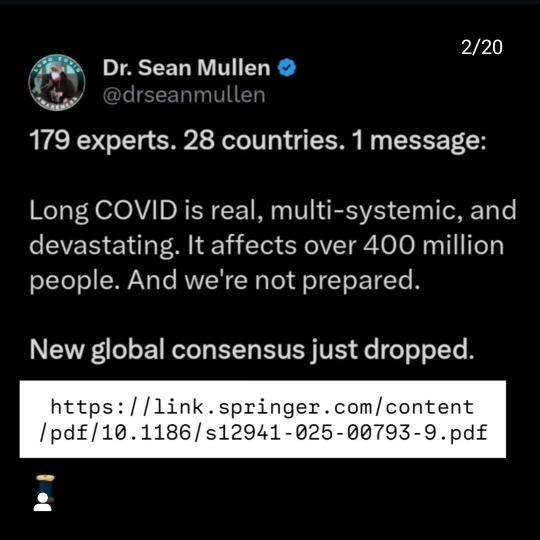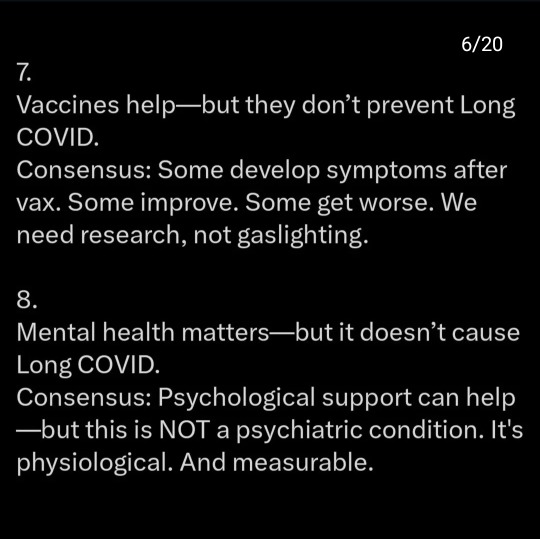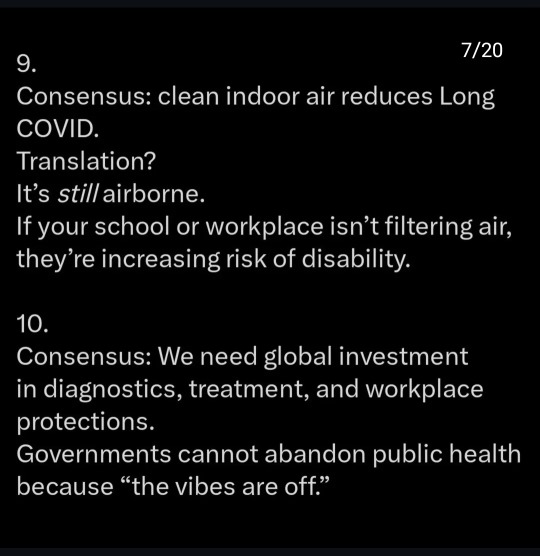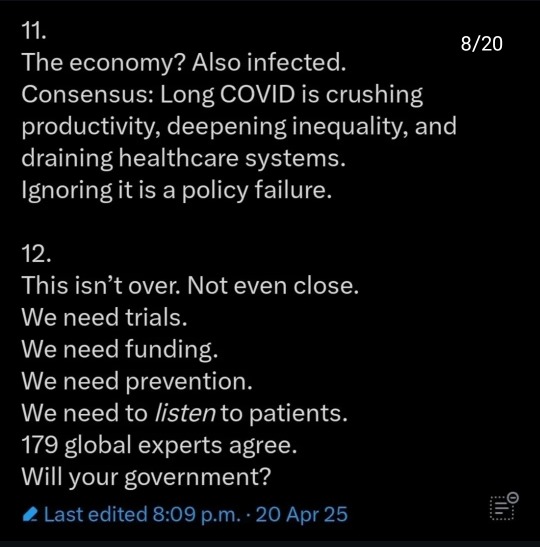Don't wanna be here? Send us removal request.
Text
We've Made Changing Your Mind Look Like a Flaw Instead of a Virtue
The internet has taught people to archive your opinions and weaponize your growth. If you evolve, you're a flip-flopper. If you admit uncertainty, you're weak. If you take time to rethink, you're stalling.
So people fake certainty to avoid punishment.
Intellectual honesty, though, requires change. If your views haven't changed in ten years, that says less about your clarity than it says about your lack of reflection.
#hmmm#this is probably one of the drivers behind anti-science attitudes#because in science you're SUPPOSED to constantly reevaluate your assumptions and the facts and make adjustments according to new information#it's how it works
3K notes
·
View notes
Text
I'm really worried for all of us. I want us to be as well as possible and for that to be the case we really gotta stay informed:










(resources compiled by sp0receress and agitpropandabsurdity on IG, I just copied em to share here)
best way to protect yourself is to wear a mask (n95 or kn95) wherever possible and do social events outside if you're not gonna mask. though the latter isn't foolproof, I read a case study of a jogger infecting a bunch of people in a park. it can happen.
4K notes
·
View notes
Text
today i learned that the finnish word for ‘hazardous waste’ is ongelmajäte, which can also translate as ‘problematic garbage’ and my roommate and i immediately agreed this is a word that belongs on tumblr.
45K notes
·
View notes
Text
"People have been telling stories about renewable energy since the nineteen-seventies, when the first all-solar-powered house opened on the campus of the University of Delaware, drawing a hundred thousand visitors in 1973, its first year, to marvel at its early photovoltaic panels and its solar hot-water system, complete with salt tubs in the basement to store heat overnight. But, even though we’ve got used to seeing solar panels and wind turbines across the landscape in the intervening fifty years, we continue to think of what they produce as “alternative energy,” a supplement to the fossil-fuelled power that has run Western economies for more than two centuries. In the past two years, however, with surprisingly little notice, renewable energy has suddenly become the obvious, mainstream, cost-efficient choice around the world. Against all the big bad things happening on the planet (and despite all the best efforts of the Republican-led Congress in recent weeks), this is a very big and hopeful thing, which a short catalogue of recent numbers demonstrates:
It took from the invention of the photovoltaic solar cell, in 1954, until 2022 for the world to install a terawatt of solar power; the second terawatt came just two years later [in 2024], and the third will arrive either later this year or early next [in 2025 or early 2026].
That’s because people are now putting up a gigawatt’s worth of solar panels, the rough equivalent of the power generated by one coal-fired plant, every fifteen hours. Solar power is now growing faster than any power source in history, and it is closely followed by wind power—which is really another form of energy from the sun, since it is differential heating of the earth that produces the wind that turns the turbines.
Last year, ninety-six per cent of the global demand for new electricity was met by renewables, and in the United States ninety-three per cent of new generating capacity came from solar, wind, and an ever-increasing variety of batteries to store that power.
In March, for the first time, fossil fuels generated less than half the electricity in the U.S. In California, at one point on May 25th, renewables were producing a record hundred and fifty-eight per cent of the state’s power demand. Over the course of the entire day, they produced eighty-two per cent of the power in California, which, this spring, surpassed Japan to become the world’s fourth-largest economy.
Meanwhile, battery-storage capability has increased seventy-six per cent, based on this year’s projected estimates; at night, those batteries are often the main supplier of California’s electricity. As the director of reliability analysis at the North American Electric Reliability Corporation put it, in the CleanTechnica newsletter, “batteries can smooth out some of that variability from those times when the wind isn’t blowing or the sun isn’t shining.” As a result, California is so far using forty per cent less natural gas to generate electricity than it did in 2023, which is the single most hopeful statistic I’ve seen in four decades of writing about the climate crisis.
Texas is now installing renewable energy and batteries faster than California; in a single week in March, it set records for solar and wind production as well as for battery discharge. In May, when the state was hit by a near-record-breaking early-season heat wave, air-conditioners helped create a record demand on the grid, which didn’t blink—more than a quarter of the power came from the sun and wind. Last week’s flooding tragedy was a reminder of how vulnerable the state is to extreme weather, especially as water temperatures rise in the Gulf, producing more moisture in the air; in late June, the director of the state’s utility system said that the chances of emergency outages had dropped from sixteen per cent last summer to less than one per cent this year, mostly because the state had added ten thousand megawatts of solar power and battery storage. That, he said, “puts us in a better position.”
All this is dwarfed by what’s happening in China, which currently installs more than half the world’s renewable energy and storage within its own borders, and exports most of the solar panels and batteries used by the rest of the world. In May, according to government records, China had installed a record ninety-three gigawatts of solar power—amounting to a gigawatt every eight hours. The pace was apparently paying off—analysts reported that, in the first quarter of the year, total carbon emissions in China had actually decreased; emissions linked to producing electricity fell nearly six per cent, as solar and wind have replaced coal. In 2024, almost half the automobiles sold in China, which is the world’s largest car market, were full or hybrid electric vehicles. And China’s prowess at producing cheap solar panels (and E.V.s) means that nations with which it has strong trading links—in Asia, Africa, South America—are seeing their own surge of renewable power.
In South America, for example, where a decade ago there were plans to build fifteen new coal-fired power plants, as of this spring there are none. There’s better news yet from India, now the world’s fastest-growing major economy and most populous nation, where data last month showed that from January through April a surge in solar production kept the country’s coal use flat and also cut the amount of natural gas used during the same period in 2024 by a quarter. But even countries far from Beijing are making quick shifts. Poland—long a leading coal-mining nation—saw renewable power outstrip coal for electric generation in May, thanks to a remarkable surge in solar construction. In 2021, the country set a goal for photovoltaic power usage by 2030; it has already tripled that goal.
Over the past fifteen years, the Chinese became so skilled at building batteries—first for cellphones, then cars, and now for entire electric systems—that the cost of energy storage has dropped ninety-five per cent. On July 7th, a round of bidding between battery companies to provide storage for Chinese utilities showed another thirty per cent drop in price. Grid-scale batteries have become so large that they can power whole cities for hours at a time; in 2025, the world will add eighty gigawatts of grid-scale storage, an eightfold increase from 2021. The U.S. alone put up four gigawatts of storage in the first half of 2024.
There are lots of other technologies vying to replace fossil fuels or to reduce climate damage: nuclear power, hydrogen power, carbon capture and storage; along with renewables, all were boosted by spending provisions in Biden’s Inflation Reduction Act and will be hampered to varying degrees by congressional rollbacks. Some may prove useful in the long run and others illusory, but for now they are statistically swamped by the sheer amount of renewable power coming online. Globally, roughly a third more power is being generated from the sun this spring than last. If this exponential rate of growth can continue, we will soon live in a very different world.
All this suggests that there is a chance for a deep reordering of the earth’s power systems, in every sense of the word “power,” offering a plausible check to not only the climate crisis but to autocracy. Instead of relying on scattered deposits of fossil fuel—the control of which has largely defined geopolitics for more than a century—we are moving rapidly toward a reliance on diffuse but ubiquitous sources of supply. The sun and the wind are available everywhere, and they complement each other well; when sunlight diminishes in the northern latitudes at the approach of winter, the winds pick up. This energy is impossible to hoard and difficult to fight wars over. If you’re interested in abundance, the sun beams tens of thousands of times more energy at the earth than we currently need. Paradigm shifts like this don’t come along often: the Industrial Revolution, the computer revolution. But, when they do, they change the world in profound and unpredictable ways...
In retrospect, it’s reasonably easy to see how fast solar and wind power were coming. But, blinkered by the status quo, almost no one actually predicted it. In 2009, the International Energy Agency predicted that we would hit two hundred and forty-four gigawatts of solar capacity by 2030; we hit it by 2015. For most of the past decade, the I.E.A.’s five-year forecasts missed [underestimated the amount of renewables] by an average of two hundred and thirty-five per cent. The only group that came even remotely close to getting it right was not J. P. Morgan Chase or Dow Jones or BlackRock. It was Greenpeace, which estimated in 2009 that we’d hit nine hundred and twenty-one total gigawatts by 2030. We were more than fifty per cent above that by 2023. Last summer, Jenny Chase, who has been tracking the economics of solar power for more than two decades for Bloomberg, told the Times, “If you’d told me nearly 20 years ago what would be the case now, 20 years later, I would have just said you were crazy. I would have laughed in your face. There is genuinely a revolution happening.”
-via The New Yorker, July 9, 2025
#unfortunately the geopolitical conflicts are already shifting from fossil fuels to the minerals needed to build the technologies#that efficiently capture and store solar power#so conflict in general over resources isn't going to go away#but it will be interesting to see the shifts in power#and there are ways of making use of renewable energy without those scarce resources#just less efficiently#so the gatekeeping will be more difficult at least
1K notes
·
View notes
Text














More Anne Taintor salty housewife memes ft. the Venerated Triad.
51 notes
·
View notes
Text
One day I woke up and everybody knew what a labubu was
61K notes
·
View notes
Text
But for real. Mutuals, tell me, what groceries have you been into lately?
#smoothies made with frozen strawberries and mangoes and strawberry yogurt and fresh squeezed orange/mandarin/tangerine juice#had beyond meat faux-chicken nuggets today for the first time and they were excellent#got a clamshell of baby spinach and pea shoots that i'm going to make a lemon pesto with for fettucine
2K notes
·
View notes
Text
honestly wei yings misunderstandings about lan wangji were 100% understandable like imagine a nun yelling at you and insisting you cover up your ankles. and youre like holy shit this lady is old fashioned and a total puritan. then she reveals no actually i have a huge ankle fetish and being around you makes me so horny i want to become an enemy of the church for you. you'd never fucking see that coming.
10K notes
·
View notes
Text
#i'd hate it but yeah#i'd just find other hobbies and read regular books#plus i could always partake in all the other fannish activities
404 notes
·
View notes
Text
not naming names but some of you are genuinely really good people and i hope that you get everything your heart wants and needs
18K notes
·
View notes
Text
Done now, but that was 1.5" in 15 minutes so it's probably for the best. I will say that woodchip mulch held together by mycelium does a fantastic job at quickly absorbing heavy rain instead of letting it run off.
Hmm. It appears that all the rain that we've missed out on the past few days (because we're a heat island so it dries up as the storm goes over, dropping rain everywhere else) decided to come down now. All at once.
At least I won't have to worry about watering the garden tomorrow.
2 notes
·
View notes
Text
Hmm. It appears that all the rain that we've missed out on the past few days (because we're a heat island so it dries up as the storm goes over, dropping rain everywhere else) decided to come down now. All at once.
At least I won't have to worry about watering the garden tomorrow.
2 notes
·
View notes
Text
It does not feel like I got nearly enough done today, but I suspect that's due to the sheer amount of it piled up. I'm going to keep going with the food prep until bedtime though.
Last week's clean laundry got folded and put away finally. New load of laundry got washed, but only half of it got fully dry on the line because it's so humid out so the remainder is hung up in the bathroom with a fan on it to finish. In the morning I'll send it briefly through the dryer to knock the stiffness out and remove lint (the heating element has been busted for a while so it doesn't actually dry clothes).
Got various vegetables trimmed, chopped, blanched if needed, and packed into the freezer to freeze. I'll vacuum-pack them tomorrow for longer term storage.
Eggs were hard-boiled and left to chill. I'll make egg salad yet tonight.
Yogurt is draining in the fridge for tzatziki that I'll also finish making tonight.
Pita bread was made into pita chips to go with the tzatziki.
Mushrooms have been trimmed and cleaned, but nothing else. They're destined to become veggie burgers, but I may have to wait until tomorrow to do that. I could mix up everything, leaving the egg out, refrigerate it, and just cook it up tomorrow (mixing in the egg then). We'll see.
I have a second batch of veggie burgers planned for the freezer using some of my homegrown roasted beets and carrots, but that can definitely wait until tomorrow.
"Crab" cakes using lion's mane mushrooms also pushed to tomorrow. Those were a surprise trade along with some side-shoot broccoli (now in freezer) in exchange for some of my chicken eggs.
Apple fritter quick bread probably pushed to tomorrow, but I may be able to swing it tonight. I do have a bunch of apples to process either for the dehydrator or to can up as sauce this week.
I did get the dishes done, but otherwise absolutely no cleaning tasks which...sigh.
Okay! Today is a mega-domestic task day. I need to do laundry, a lot of food prep/preservation, and at least some cleaning.
I have had a coffee beverage for energy.
I slept an extra six hours (!!!) yesterday so the tank should be topped up.
Let's get this done!
5 notes
·
View notes



